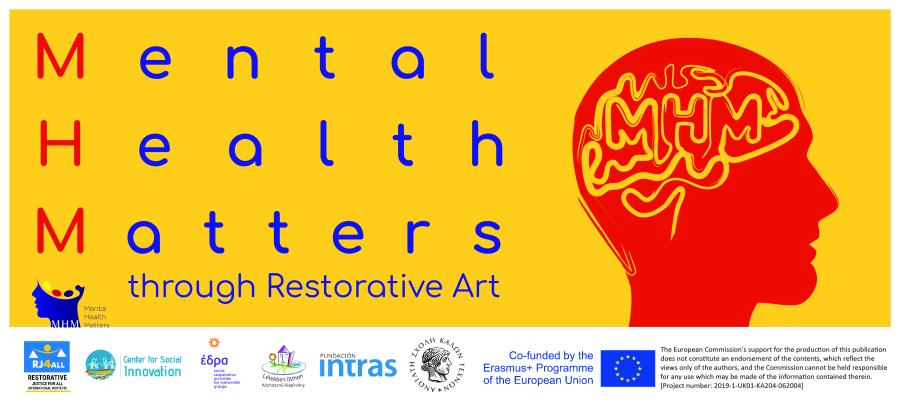The World Health Organisation called for mental health to be treated as everyone's responsibility as it does not only affect the lives of people living with mental health problems and their carers but society as a whole. People with mental health illnesses and particularly the ones living in mental health structures are at the leading edge of socially disadvantaged groups, suffering from stigmatisation and marginalisation as well as social injustices.
Creative activity and art making has been used in mental health settings as a healing tool in many forms (psychotherapy, counseling etc.). This is happening not only ‘because it serves as another language but also because of its inherent ability to help people of all ages explore emotions and beliefs, reduce stress, resolve problems and conflicts, and enhance their sense of well-being.’ (Malchiodi, 2003, p. xi) However, this is not the case for many European countries. Furthermore, now more than ever there is an evident need of more contemporary approaches which will help restore the balance in mental health structures. In addition, the potential and benefits of combining art therapy with restorative justice arestill not translated into educational material and programmes leaving many adult learners andprofessionals in the field unaware.
Mental Health Matters through Restorative Art (MHM) is an innovative European project co-funded by Erasmus+ KA2 Strategic Partnerships in the field of adult education which aims to respond to this gap. MHM brings together a cross-sector, strategic partnership of 6 organisations to support innovation in the adult education field by creating, piloting and disseminatingeducational material and tools tailored to the needs and realities of mental health professionals,restorative justice practitioners and artists in the participating countries (the UK, Cyprus, Greece,Spain, Hungary) and across Europe. MHM also designed and accredited e-courses that will enhancethe skills and knowledge of adult learners, supporting in this way the setting up of, and access to,upskilling pathways.
Intellectual outputs of the program:
IO4 – Mental Health Matters in Action: E-book (Currently developed)
The main service of the project, which are the interactive online learning courses, can be accessed for free through the official website www.mentalhealthmatters.eu/e-learning/, where the user will also be able to find information about the results of the project, as well as the complete educational knowledge and skills delivery material.The educational material of the platform, as well as the other products of the project are provided in four languages (Greek, English, Spanish, Hungarian).
The MHM program cooperative consists of six specialised partners in the fields of mental health, restorative justice, social work and innovation:
Restorative Justice for All, United Kingdom
Center for Social Innovation (CSI) - Cyprus
Lélekben Otthon Közhasznú Alapítvány, Hungary
ANOTATI SCHOLI KALON TECHNON, Greece
The main impact of the MHM project on the wider community (local, national and international) is the improvement of knowledge, competences and attitudes of mental health professionals, emerging artists and restorative justice practitioners. Over 10,000 individuals and organisations are expected to be reached through the project's IOs, 6 multiplier events and 1 Learning and teaching training. The online availability of all training materials and tools for at least 5 years after EU funding, as well as their translation in 4 languages will ensure sustainability of impact in the long run. Finally, MHM aims to use its findings to inform EU integration, healthcare and other relevant policies. Thus, the achievement of the project objectives will lead a step towards WHO/Europe priorities for mental health.
For more information about the MHMproject visit the official website at www.mentalhealthmatters.eu , its official social media pages (Facebook, Instagram, YouTube) or contact Mrs. Georgia Nicolaou, CSI EU Project Manager at georgia.nicolaou@csicy.com.
- Kirjaudu sisään, jotta voit julkaista kommentteja

